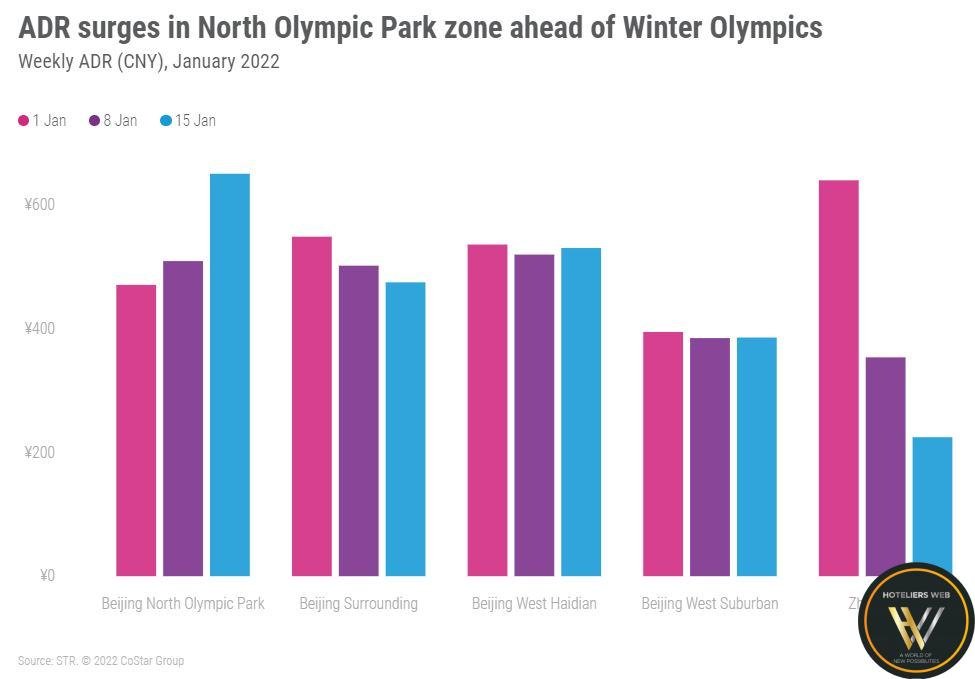Overlap between the Lunar New Year, 2022 Winter Olympic Games and the ongoing pandemic will create a conflicting mix of demand drivers for hoteliers in Beijing. With New Year celebrations typically driving travelers out of major metros, the Olympic Games pushing demand into the event center, and China’s zero-tolerance COVID-19 precautions overlaying both major events, February will be a month to remember for the Chinese capital.
Lunar New Year
Even pre-pandemic, Lunar New Year was not a major demand driver for Beijing as business travel typically falls substantially in the two weeks leading up to the weeklong holiday. Some leisure demand lifts occupancy in the days following, but Lunar New Year holiday travel is strongly associated with visiting family or enjoying suburban or rural vacations.https://flo.uri.sh/visualisation/8529207/embed?auto=1
Over the past two years, active lockdowns or travel advisories over the holiday period further depressed occupancy. While not under lockdown this year, restrictions are still in place that make travel into and out of Beijing difficult, which will likely deter leisure travel into the capital. The Olympic Games may also reduce Beijing-based holiday travel, as the popular Beijing suburb, Yanqing, is inaccessible to travelers as part of the Games’ “closed loop” system.
Olympic Games
Not unlike the 2020 Summer Olympics in Tokyo last year, tickets to the 2022 Winter Olympics in Beijing are not available to the public, and the Games will be held in a closed loop “bubble” to minimize any potential spread of COVID-19.
The Games will be played over three competition zones spanning five STR-defined submarkets:
- Beijing zone in the Beijing North Olympic Park, Beijing West Haidian, and Beijing West Suburban submarkets
- Yanqing zone in the Beijing Surrounding submarket
- Zhangjiakou zone in Chongli, part of the Zhangjiakou submarket

While all three zones have Olympic villages for athletes, area hotels will also benefit from Olympic officials and government delegations.https://flo.uri.sh/visualisation/8529263/embed?auto=1
With only two weeks left until the games start, average daily rate (ADR) has already started to rise in the Beijing North Olympic Park submarket, the home of several major competition venues and the National Stadium, where the Opening and Closing Ceremonies will take place. ADR will likely rise substantially around Friday, 4 February in all competition zones as foreign dignitaries and IOC officials attend the Opening Ceremony.
ADR will remain above pre-Olympics levels in Beijing West Haidian and Beijing West Suburban following the Opening Ceremonies, but the Olympics’ strict restrictions will lead to reduced demand and increased competition among the neighboring submarkets. ADR in the other competition zones will also rise during the Games, although government contracts and reduced demand may act as a rate cap.
Expectations
While Beijing 2022 will no doubt carry the same excitement as PyeongChang 2018, the pandemic restrictions will weigh on hotel performance. Combined with the Lunar New Year, which typically depresses both occupancy and ADR in the capital, February hotel performance will strengthen compared with January but remain muted, with ADR anticipated to index stronger to 2019 than occupancy.
Over the course of the pandemic, Beijing has performed admirably during periods in which the market isn’t locked down, and after the Games end and associated restrictions are lifted, hotel demand should rebound rapidly.






